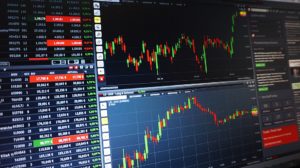 One glance at headlines relating to Forex Trading will tend to show the practise in a favorable light when compared to other potential money making options. Not all articles have an agenda either and among the neutral copy is a piece by the Independent newspaper on how this can be a more lucrative method than equities for example.
One glance at headlines relating to Forex Trading will tend to show the practise in a favorable light when compared to other potential money making options. Not all articles have an agenda either and among the neutral copy is a piece by the Independent newspaper on how this can be a more lucrative method than equities for example.
Forex is similar to other forms of trading in the sense that while there can be big profits to be made, it’s a highly volatile practise and anyone entering the world of currency trading for the first time must be aware of the potential losses for a bad call.
The Basics
Obviously, anyone looking to trade on the Forex markets will need a grip of the basic elements together with an understanding of what external factors can have a bearing on rates. At its very basic level, Forex means selling one currency and getting another back in exchange at the market rate that is applicable on that specific day.
The trader will then look to hold on to their new currency in the hope that it will strengthen and that its rate will increase. At a certain point in time, the aim is to then sell that on and make a profit. It all sounds very simple and Forex Traders make the practise of buying and selling a very straightforward one.
Naturally, the key is to exchange at the right time. Big profits can be made but so can significant losses so unless you are dealing in pennies or cents, this isn’t for the faint hearted. As with the three key methods that we will discuss here, you can always make ‘dummy trades’ before you part with any real money by checking current rates, making a notional trade and recording it on paper before following the development of the currency that you would potentially hold as a result.
That’s a very basic guide to currency trading so what are the advantages of this, against other traditional methods of speculating?
Spread Betting
Traditionally, Spread Betting has been associated with the world of sports but it can also be used in conjunction with the financial markets. Whichever area you’re looking for, this is a definite alternative to Forex Trading so what is the principle and what are the pros and cons here?
In a sporting realm, a bookmaker would set a line known as the spread. Let’s say you are betting on the number of points that a driver may achieve in a regular Formula One season. The spread may be set at 275-300 and your task is to bet over or under that line depending on how many points you feel that the driver will finish with at the end of that campaign.
If you win, your stake would be multiplied by the number of units by which the driver has exceeded the spread so, if you went over 300, staked £100 and the final points tally was 330, you would be paid 30 x £100 equalling £3000.
There is potential here for high wins but as you will see, the system means that significant losses may also have to be endured. In terms of volatility, neutral observers would say that spread betting is tougher to predict than currency trading with the potential for very high swings either above or below the spread.
There is a tax advantage at the bookmakers however with all profits in the UK at least, being considered to be free of any tax. Once again, there is scope to try out a dummy spread before parting with any cash.
Real Estate
One alternative to the above that often gets suggested is Real Estate Trading: Buying and flipping properties or embarking on a parallel career as a landlord with a buy to let purchase that can allow you to earn money from tenants while looking at an eventual sale further down the line.
With Buy to Let, owners can enjoy a regular income while they sit on their investment but there are potential downsides. Homes can be empty during a downturn in the market and there can be problems with rogue tenants. Potential damage to homes can lead to excessive repair bills which eat away at a property owner’s investment so it’s not a practise to be entered into without proper research into the potential pitfalls.
Real Estate trading may also require a much larger portfolio than either of the two trading options that we’ve previously discussed. The financial risk is also there and it’s much harder to trial this but the potential rewards are significant.
As previously mentioned, none of these methods should be entered into lightly and of the three, Forex trading could be the better option in terms of getting a broker on your side who can provide some advice.
In the other cases, beginners are essentially on their own to understand the basics and the pros and cons of potentially making a sizeable trading profit.
But how is Forex trading different?
“I would not equate forex trading with spread betting or real estate. While spread betting is in fact an activity based on highly random variables, forex trading depends on observable circumstances such as the performance of macroeconomic variables and the sentiment of market participants. These variables determine the trend of the currencies and, using the tools of fundamental and technical analysis, we can devise very profitable strategies. Unlike real estate, however, it is a much more dynamic activity, made of continuous openings and closures of operations, even several times a day. The “buy and hold” strategy, which is the basis of real estate trading, is neither winning nor advisable.” Said senior analyst at BP PRIME, Emanuele Canegrati
“The risk appetite of a Forex trader is halfway between that of spread betting and that of the real estate trader. And its dynamism must be maximum. You cannot just watch the events after buying, as in the other two businesses but must continually observe what happens on the market and decide how to change positions.” Mr Canegrati concluded.




No Comments